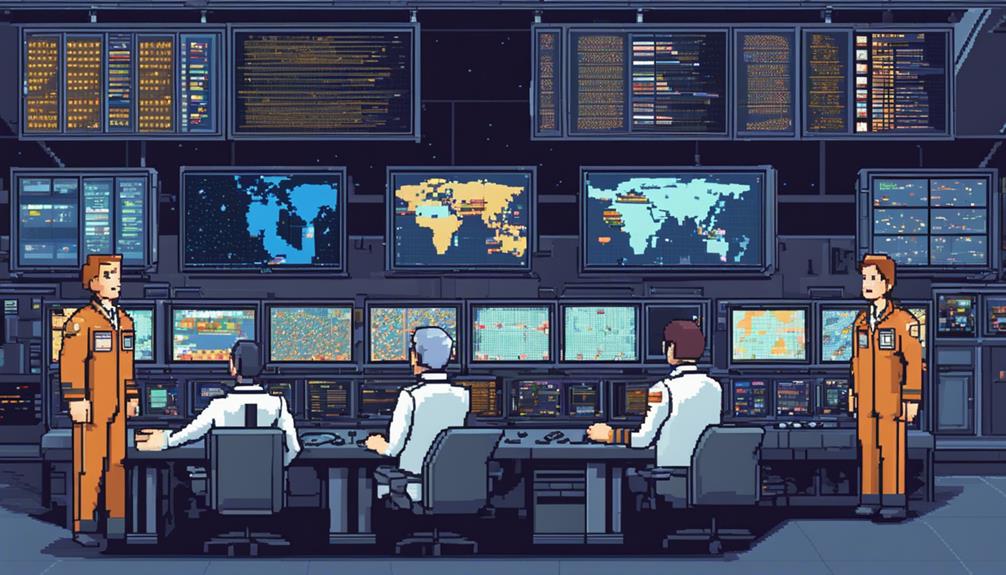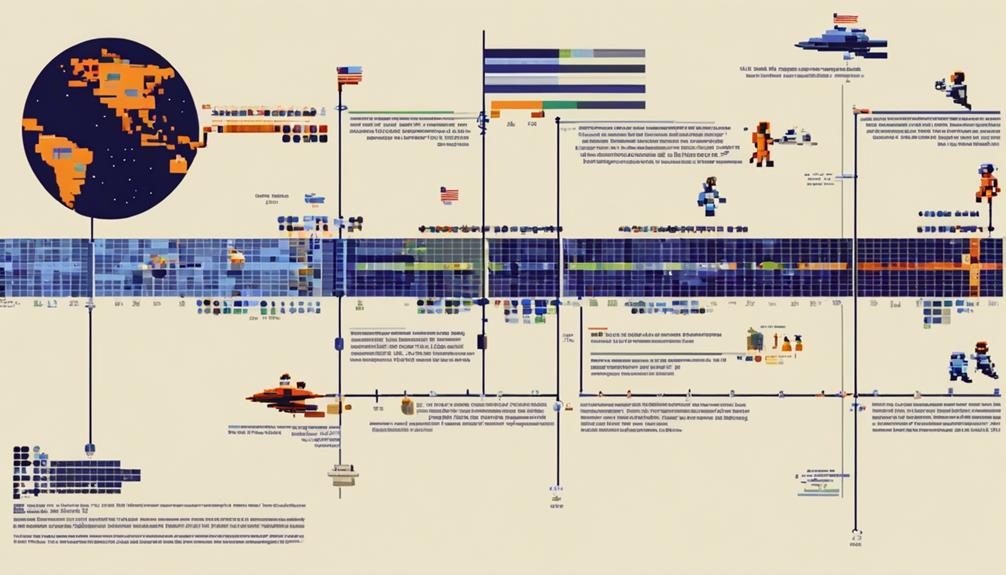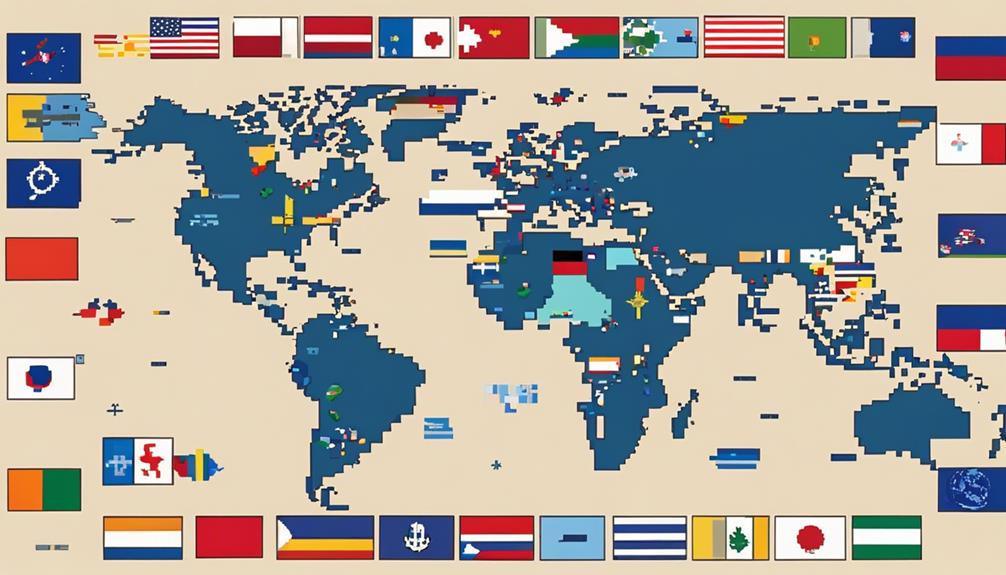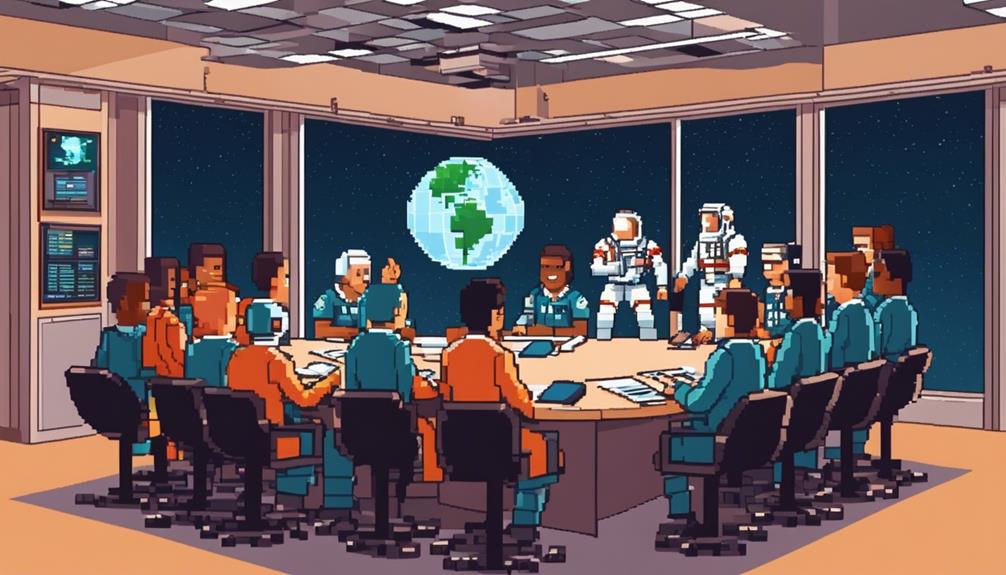The intricate web of regulations and mechanisms governing the space environment is a critical aspect of ensuring the sustainability and safety of activities beyond our planet. From the management of space debris to the allocation of space resources, the global governance framework faces numerous challenges in navigating the complexities of outer space. With the ever-expanding interest in commercial space ventures and the potential for conflicts in space activities, the need for robust and adaptable governance structures becomes increasingly paramount. The interplay of international agreements, technological advancements, and the involvement of diverse stakeholders shapes the future of space governance in a continuously evolving landscape.
Key Takeaways
- Global space governance involves international agreements and treaties to address challenges like space debris and resource exploitation.
- UNOOSA and COPUOS play vital roles in overseeing and coordinating global space governance efforts.
- Historical evolution from Cold War competition to current non-UN governance approaches like the Artemis Accords shapes space governance.
- International cooperation is crucial for managing space debris, addressing geopolitical dynamics, and ensuring sustainable space activities.
Overview of Global Space Governance

Exploring the regulatory landscape governing global space activities provides a comprehensive understanding of the intricate frameworks established to ensure the safety, sustainability, and peaceful utilization of outer space. Global space governance involves a complex network of international agreements, treaties, and codes of conduct aimed at addressing a myriad of challenges such as space debris mitigation, satellite collisions, and responsible resource exploitation. These agreements form the foundation of cooperation among space-faring nations, fostering a collaborative environment essential for the effective management of activities in space.
One critical aspect of global space governance is the regulation of satellite operations. Satellites play a crucial role in various aspects of modern life, including communication, navigation, and Earth observation. To prevent overcrowding and collisions in orbit, international agreements govern aspects such as satellite launch coordination, orbital slots allocation, and end-of-life disposal practices. By adhering to these regulations, states can ensure the sustainable use of space resources while minimizing the risks posed by space debris.
UN's Role in Space Governance
The United Nations' pivotal role in overseeing and coordinating global space governance is exemplified through the functions of UNOOSA and the UN Committee on the Peaceful Uses of Outer Space (COPUOS), which serve as instrumental bodies in promoting international cooperation and upholding the principles of responsible space activities. UNOOSA, as the primary UN entity for space governance, plays a crucial role in fostering collaboration among nations for the peaceful use of outer space. It facilitates capacity-building initiatives, assists states in developing their space capabilities, and supports the implementation of international space law and treaties to ensure that activities in space are conducted responsibly and sustainably.
COPUOS, on the other hand, is instrumental in discussing and formulating norms that guide space governance. Through these entities, the UN provides a platform for member states to engage in dialogue, exchange information, and enhance their understanding of space governance principles. This framework not only promotes cooperation but also helps in preventing conflicts and misunderstandings in space activities. By emphasizing responsible behavior and adherence to established regulations, the UN contributes significantly to the maintenance of a secure and sustainable space environment for all nations involved in space exploration and activities.
History of Space Race Governance

During the Cold War era, the emergence of space race governance marked a pivotal shift towards prioritizing national security and competition in space exploration. The United States and the Soviet Union were the key players in this governance framework, aiming to assert their dominance in space activities. Treaties such as the Outer Space Treaty of 1967 played a crucial role in shaping the direction of space race governance by promoting international cooperation and the peaceful use of outer space.
As the space race governance evolved, it began to emphasize collaborative efforts in space exploration and environmental protection. The principles of peaceful use and non-appropriation of outer space became integral components of this governance structure. While initially driven by competition, the governance framework eventually paved the way for shared goals and mutual benefits in space activities. This historical context laid the foundation for future space governance initiatives, highlighting the importance of international cooperation and collective responsibility in managing the space environment.
Non-UN Governance Approaches
Numerous non-UN governance approaches, exemplified by initiatives such as the Artemis Accords, are reshaping the landscape of space governance by delineating norms and fostering collaboration in lunar exploration and resource utilization. These approaches mark a significant departure from traditional UN-led governance structures and introduce key elements that address the evolving needs of the space sector.
Key Points:
- Artemis Accords: The Artemis Accords, spearheaded by the United States, serve as a foundational example of non-UN governance in space. These accords lay down principles for lunar exploration and resource utilization while actively involving the private sector in these endeavors.
- Norms for Space Activities: A core focus of these non-UN approaches is the establishment of norms for space activities. By defining guidelines and regulations, these initiatives aim to ensure responsible conduct in space exploration and utilization.
- Transparency and Cooperation: The Artemis Accords and similar frameworks emphasize transparency and international cooperation. By promoting open communication and collaboration among participating nations, these initiatives seek to foster a spirit of unity and shared progress in space endeavors.
Need for Evolving Space Governance

The current challenges in space governance, including emerging space threats and increasing commercial activities, highlight the pressing need for an evolved global framework. As space becomes more congested and contested, international cooperation is essential to address issues such as property rights, liability, and dispute resolution. Establishing clear regulations and norms will be crucial in ensuring the safety and sustainability of space activities in the face of growing complexities.
Current Challenges in Space Governance
Evolving space governance necessitates a comprehensive reassessment and adaptation to effectively address the escalating challenges posed by the exponential growth of space debris in Earth's orbit.
Key Challenges in Space Governance:
- High Collision Risks: The increasing number of satellites and debris pieces significantly heighten the risk of collisions in space due to their high speeds.
- Limited Collaborative Efforts: The lack of extensive collaboration for space debris remediation underscores the difficulty in managing the expanding debris field.
- Urgent Need for Debris Mitigation: Practical strategies for debris mitigation are imperative to prevent catastrophic collisions, the Kessler effect, and ensure space safety within the existing space governance framework.
Emerging Space Threats
Amidst the escalating proliferation of space debris and the associated heightened collision risks, there arises a critical imperative for the evolution of space governance to effectively address these emerging space threats. The exponential growth of space debris, currently comprising over 8,410 satellites and 36,500 debris pieces orbiting Earth, poses significant challenges. The high speeds of debris elevate collision risks, endangering operational satellites and spacecraft. Moreover, the looming specter of the Kessler effect in low-Earth orbit, where debris buildup may trigger a chain reaction of collisions and further debris creation, underscores the urgency of the situation. While some collaborative efforts exist for space debris mitigation, practical removal strategies are lacking. Therefore, proactive steps and enhanced international cooperation in space debris management are imperative to avert catastrophic collisions in space.
International Cooperation Essential
In the realm of space governance, fostering international cooperation is paramount for effectively addressing the evolving challenges posed by space threats.
Key Points:
- Collaborative Efforts: Coordinated actions are essential for managing space debris and ensuring the sustainability of space activities.
- Multilateral Agreements: Establishing and adhering to multilateral agreements is crucial in shaping the future of space governance.
- Modern Challenges: Updated governance frameworks are necessary to tackle the modern challenges presented by the dynamic space environment.
International cooperation not only enhances the sharing of resources and expertise but also promotes a unified approach towards space governance. Organizations like UNOOSA play a critical role in facilitating collaborative efforts and fostering a harmonized global response to the evolving threats in space.
Geopolitical Dynamics in Space Governance

Geopolitical dynamics play a pivotal role in shaping space governance, impacting the implementation of space treaties and fostering international cooperation. Challenges arising from differing security concerns among space-faring nations further complicate the landscape of space governance. As the race for space resources intensifies, the need for a balanced global governance framework becomes increasingly urgent to mitigate conflicts and enhance collaboration.
Space Treaties Impact
The impact of space treaties on global governance dynamics is intricately linked to the diverging perspectives of key spacefaring nations like Russia, China, and the US.
Key Points:
- The five foundational UN space treaties aim to prevent militarization and colonization of outer space.
- Geopolitical tensions influence interpretations and enforcement of space treaties.
- Bilateral agreements, like the Artemis Accords, impact global governance dynamics.
These differing views on space governance among major players shape international norms. Australia's unique position as a signatory to both the Artemis Accords and the Moon Agreement showcases the varying approaches countries take towards space governance. The interplay of these factors underscores the complexities involved in regulating and governing activities in outer space.
International Cooperation Challenges
The evolving dynamics of international cooperation in space governance present intricate challenges shaped by the geopolitical interactions among major spacefaring nations such as the US, Russia, and China. These challenges encompass issues of multilateral accountability, differing approaches to property rights, and evolving norms in space activities. The US has been influential in shaping space governance through initiatives like the Artemis Accords, emphasizing property rights. Conversely, collaboration between Russia and China on a lunar research base showcases the evolving norms in space governance, reflecting changing dynamics in international cooperation. The lack of multilateral accountability in space exploration governance poses risks for effective cooperation, highlighting the complexities that arise from the geopolitical dynamics in shaping the governance of space activities.
Security Concerns in Space
In the realm of space governance, Security Concerns emerge as a pivotal focal point, intricately intertwined with geopolitical dynamics and international relations.
3 Key Points:
- Geopolitical tensions are fueled by differing views on property rights, exemplified by the creation of the Artemis Accords by the US.
- Criticism from major space-faring nations like Russia and China towards the Artemis Accords shapes norms in space exploration, highlighting conflicts in global space governance.
- The collaboration between China and Russia on a lunar research base showcases the evolving dynamics of international relations in space, emphasizing the need for cooperation amidst geopolitical tensions.
Property Rights in Space Governance

Navigating the complexities of property rights within space governance necessitates a nuanced approach that balances private ownership with international agreements. Property rights in space governance play a critical role in regulating ownership and utilization of space resources. The Artemis Accords have introduced provisions allowing for private ownership of space resources, sparking debates and raising questions about the extent of ownership rights in outer space. This has led to conflicts between the Artemis Accords and the Moon Agreement, which take different stances on property rights in space.
Defining clear property and ownership rights is essential for the future governance of space activities. Multilateral oversight regimes are necessary to ensure peaceful exploration and utilization of space resources, preventing disputes and promoting cooperation among nations and private entities. These oversight mechanisms will be crucial in addressing issues related to property rights, ensuring that the exploitation of space resources is done in a manner that is fair, sustainable, and beneficial for all stakeholders involved.
Managing Space Debris
In the management of space debris, crucial areas of focus include the development of advanced debris tracking technology to monitor and predict potential collisions, the establishment of international debris mitigation measures to prevent further debris accumulation, and the exploration of space debris cleanup initiatives to actively remove hazardous debris from key orbital paths. Efforts in these key areas are essential to safeguarding space infrastructure and ensuring the long-term sustainability of space activities.
Debris Tracking Technology
Utilizing ground-based radar systems, the global governance of space environment employs advanced debris tracking technology to monitor over 8,410 satellites and 36,500 debris pieces in Earth's orbit. This technology helps predict potential collisions between active satellites and debris, reducing risks to valuable space assets. Continuous monitoring and tracking of space debris are crucial for ensuring the safety and sustainability of space activities. With technology advancements, real-time updates on debris trajectories and potential collision risks are now possible. Collaboration among space agencies and organizations plays a vital role in sharing tracking data and coordinating debris avoidance maneuvers, further enhancing the effectiveness of debris tracking technology in safeguarding space assets.
International Debris Mitigation
International efforts are being intensified to address the challenges of managing space debris through effective debris mitigation strategies. With over 8,410 satellites and 36,500 debris pieces orbiting Earth, the risk of collisions and the potential onset of the Kessler effect in low-Earth orbit are significant. While debris mitigation guidelines are in place, the lack of practical removal strategies exacerbates the issue, necessitating improved international cooperation for space sustainability. Current collaborative efforts for space debris remediation are limited, highlighting the need for increased joint initiatives to ensure the long-term safety of outer space activities. The growing threat of catastrophic collisions resulting from debris buildup underscores the importance of implementing cohesive and proactive measures to mitigate collision risks and preserve the integrity of outer space operations.
Space Debris Cleanup
Efficient management of space debris through targeted removal initiatives is imperative in safeguarding the operational integrity of Earth's orbital environment.
Key Points:
- Kessler Effect Risk: The growing number of satellites and debris pieces orbiting Earth heightens collision risks, potentially triggering the Kessler effect.
- Lack of Debris Removal Strategies: While space debris mitigation guidelines exist, practical debris removal strategies are currently insufficient, emphasizing the need for innovative solutions.
- Importance of Collaborative Efforts: Limited collaboration among nations in addressing space debris cleanup impedes progress, emphasizing the necessity for global cooperation in developing effective debris remediation methods to avert catastrophic collisions.
Dispute Resolution in Space Governance
In the realm of global governance concerning the space environment, the effective resolution of disputes plays a crucial role in ensuring the peaceful and sustainable utilization of outer space resources and activities. Dispute resolution in space governance involves addressing conflicts that may arise from various factors such as differing interpretations of treaties, agreements, or property rights related to space activities and resources. Mechanisms for resolving these disputes typically include negotiation, mediation, arbitration, and adjudication.
The UN Committee on the Peaceful Uses of Outer Space (COPUOS) serves as a key platform for facilitating discussions and potential resolutions related to disputes within the realm of space governance. By providing a forum for member states to engage in dialogue and seek solutions through diplomatic means, COPUOS contributes to the overall goal of maintaining peace, cooperation, and sustainability in outer space activities.
To better understand the mechanisms of dispute resolution in space governance, the following table outlines the key methods and their roles:
| Mechanism | Description |
|---|---|
| Negotiation | Direct discussions between involved parties to reach a mutually acceptable agreement. |
| Mediation | Involvement of a neutral third party to assist the disputing parties in reaching a settlement. |
| Arbitration | Resolution of disputes by a neutral third party, whose decision is usually binding on parties. |
| Adjudication | Formal legal process where disputes are settled by a judge or panel following legal procedures. |
Commercialization of Space Activities

The rapid expansion of commercial activities in space has significantly transformed the global economy and reshaped the landscape of space exploration. This transformation is marked by the following key developments:
- Economic Contribution: Commercialization of space activities now contributes nearly USD $350 billion annually to the global economy, indicating the substantial economic impact of private sector involvement in space governance.
- Technological Advancements: Technological innovations within commercial space activities are propelling economic growth and fostering new opportunities for space exploration. These advancements are crucial in maintaining the competitiveness of commercial entities in the space sector.
- Space Mining and Launch Capabilities: The emergence of space mining and engineering as potential sources of future economic growth highlights the diversification of commercial space activities. Concurrently, increased launch capabilities among private entities are fueling growth and enhancing competitiveness within the sector.
The integration of commercial space activities into the global economy represents a paradigm shift in space governance, necessitating the adaptation of regulatory frameworks to accommodate the evolving landscape of commercial space exploration. As the private sector continues to drive technological advancements and economic growth in space, ensuring effective governance mechanisms becomes paramount for harnessing the full potential of commercial space activities.
Future Trends in Space Governance
As space governance progresses into the future, emerging regulatory challenges necessitate a proactive approach to address evolving threats and opportunities in the realm of commercial and private sector space activities. Future trends in space governance will revolve around the need for updated regulations to cope with emerging threats such as cyberattacks and the militarization of space. The landscape of space governance is shifting to accommodate the rise of commercial activities like asteroid mining and space tourism, demanding the establishment of new regulatory frameworks to ensure responsible and sustainable practices. With increasing private sector involvement in space endeavors, there is a pressing need to strike a balance between commercial interests and the imperatives of safety and sustainability within governance structures. Collaborative efforts will be paramount in managing challenges like space debris, satellite collisions, and the effective regulation of space traffic. Consequently, the development of new global space governance structures will be indispensable in fostering cooperation, averting conflicts, and safeguarding the enduring and equitable utilization of outer space resources.
| Emerging Threats | Commercial Activities |
|---|---|
| Cyberattacks | Asteroid Mining |
| Space Militarization | Space Tourism |
Frequently Asked Questions
Why Is Space Governance Important?
Space governance is crucial due to numerous factors. It ensures environmental protection in space activities, promotes international cooperation for resource management, addresses space debris concerns, regulates satellite licensing, supports space exploration, facilitates commercial activities, and establishes a legal framework for space operations. Without effective governance, these aspects could lead to conflicts, safety hazards, and unsustainable practices. Thus, space governance is essential for the responsible and sustainable use of outer space.
What Is the Governing Body for Space?
The governing body for space is the United Nations Office for Outer Space Affairs (UNOOSA). UNOOSA plays a crucial role in fostering international cooperation for peaceful uses of outer space, overseeing the implementation of key space treaties, supporting states in their space-related activities, and facilitating capacity-building initiatives. It serves as a central hub for coordinating global efforts in space governance, including regulatory frameworks, commercial activities, military presence, space exploration, and environmental protection.
What Are the Challenges of Space Governance?
The challenges of space governance encompass a myriad of issues including space debris, commercial activities, military presence, environmental protection, resource allocation, international cooperation, legal frameworks, and space sustainability. Space debris poses collision risks, while balancing commercial interests with environmental concerns and ensuring equitable resource allocation remains complex. Moreover, the need for international cooperation and robust legal frameworks to address these challenges is crucial for the long-term sustainability of outer space activities.
How Should Space Be Governed?
International cooperation is fundamental for the effective governance of space. A robust regulatory framework encompassing satellite licensing, sustainability measures, and legal implications is crucial. Emphasizing responsible behavior in commercial activities and addressing challenges like space debris are key components. Ensuring transparency and adherence to international agreements are essential for the long-term sustainability of space exploration. Continual adaptation and enhancement of governance structures are necessary to navigate the dynamic landscape of space governance.

